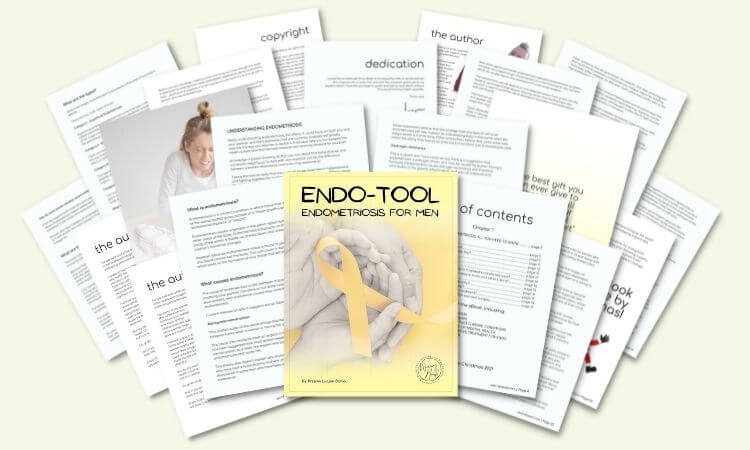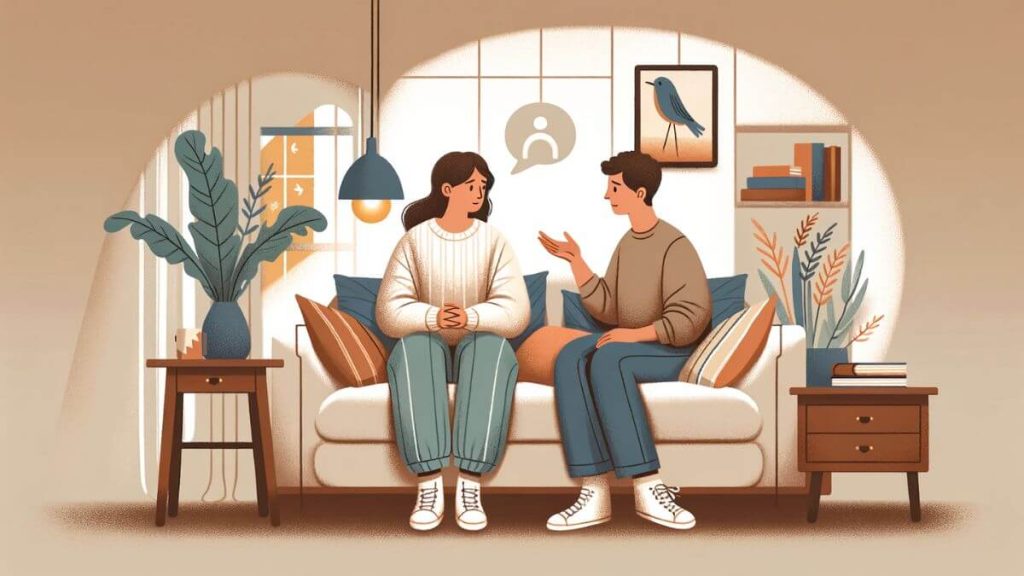Endometriosis and Handling Partner’s Mood Swings
Being a husband to a wife who has two chronic conditions can be incredibly challenging but today I will not be talking about fibromyalgia but endometriosis. When it comes to endometriosis and handling a partner’s mood swings, there is a lot I can say, but in a nutshell…
Endometriosis management involves medical treatments like hormone therapy, pain relief, and, in severe cases, surgery. For a partner’s mood swings, understanding, communication, and professional counseling are key. Both require empathy, patience, and a supportive approach.
- Endometriosis and Handling Partner's Mood Swings
- The Physical Symptoms of Endometriosis
- The Emotional Impact of Endometriosis
- How Endometriosis Affects Intimacy
- Coping Strategies for Couples
- Overview of How Endometriosis Affects Relationships
- Understanding Endometriosis and Its Impact on Relationships
- Supporting Your Partner with Endometriosis
- Seeking Help and Resources
- Strengthening Your Relationship Despite Endometriosis
- Source Links
Endometriosis and Handling Partner’s Mood Swings
Endometriosis is a challenging condition that not only affects the individuals with the condition but also has a significant impact on their partners. Living with endometriosis can cause physical symptoms like pelvic pain, painful periods, and fertility issues. These symptoms can lead to mood swings and emotional distress, putting a strain on the relationship.
But fear not, there are coping strategies and ways to provide emotional support that can help you and your partner navigate the ups and downs of endometriosis while maintaining a healthy and fulfilling relationship. In this article, we will explore techniques for managing emotions, communicating needs, and understanding the impact of endometriosis on both of you. It’s time to prioritize your emotional well-being and strengthen your bond despite the challenges.
If you want to learn more about endometriosis, I wrote an “Endo-Tool, Endometriosis for Men” e-Book.
You can get the 1st Chapter of the e-Book for FREE, and if you like it, you’ll get a Whopping 33% Discount on the Whole Book, plus discounts on other helpful tools. You have nothing to lose but a lot to gain!
The first chapter alone contains all the comprehensive medical knowledge about endometriosis, including:
- What is endometriosis?
- What are the symptoms?
- What causes endometriosis?
- What does endometriosis look like?
- What are the stages?
- What are the types?
- What is adenomyosis and how is it related to endometriosis?
- Why do some women develop severe endo and others don’t?
- Does endometriosis cause infertility?
- How is endometriosis diagnosed?
- Do types and stages affect the treatment?
- Recurrence of endometriosis after excision surgery.
FREE Chapter of “Endo-Tool”
Endometriosis e-Book for Men

The Physical Symptoms of Endometriosis
Endometriosis can cause a variety of physical symptoms that can significantly impact the daily lives of individuals affected by the condition. These symptoms include:
- Pelvic pain: A common symptom of endometriosis, pelvic pain can range from mild to severe and is often described as a sharp or burning sensation.
- Painful sex (dyspareunia): The presence of endometrial tissue in or around the vagina can lead to pain during sexual activity, causing strain on intimate relationships.
- Heavy menstrual bleeding (menorrhagia): Endometriosis can cause excessive and prolonged menstrual bleeding, which can interfere with daily activities and lead to emotional stress.
- Fertility issues: Endometriosis can impact fertility by causing blocked fallopian tubes or interfering with ovulation and the implantation of a fertilized egg.
These physical symptoms can have a profound impact on the emotional well-being of individuals with endometriosis and their partners, making it vital to seek appropriate support and management strategies.
Managing these physical symptoms requires a comprehensive approach that may involve medical treatments, lifestyle changes, and emotional support. It is crucial for individuals with endometriosis and their partners to seek professional guidance and work together to navigate the challenges posed by these symptoms.
| Physical Symptom | Description |
|---|---|
| Pelvic pain | A sharp or burning sensation in the pelvic area. |
| Painful sex (dyspareunia) | Discomfort or pain during sexual activity, often caused by endometrial tissue. |
| Heavy menstrual bleeding (menorrhagia) | Excessive and prolonged menstrual bleeding, which can interfere with daily activities. |
| Fertility issues | Difficulties in conceiving or maintaining a pregnancy due to endometriosis-related factors. |

The Emotional Impact of Endometriosis
Endometriosis can have a profound emotional impact on individuals with the condition as well as their partners. The chronic pain and other symptoms associated with endometriosis can lead to feelings of isolation, anxiety, and depression. Coping with these emotional challenges is essential for maintaining a healthy relationship.
Individuals with endometriosis may experience a sense of isolation due to the physical and emotional toll the condition takes on their daily lives. The pain and discomfort can limit their ability to engage in social activities and lead to a withdrawal from friends and loved ones. This isolation can also contribute to feelings of anxiety and depression, as individuals with endometriosis may struggle to find support and understanding from others.
Partners of individuals with endometriosis may also experience their own emotional challenges. They may feel helpless or unsure of how to support their partner through the pain and symptoms. Witnessing a loved one suffer can be emotionally distressing, and partners may struggle with feelings of guilt or frustration.
Managing the emotional impact of endometriosis is crucial for both individuals and their partners.
Open and honest communication about emotions and needs is essential, as it allows both parties to express their feelings and offer support. Seeking professional help, such as therapy or counseling, can also provide valuable tools and strategies for managing emotions and navigating the challenges of endometriosis together.
Managing the emotional impact of endometriosis requires patience, empathy, and understanding from both individuals and their partners. By prioritizing communication, seeking support, and implementing coping strategies, couples can navigate the emotional challenges of endometriosis and maintain a strong and supportive relationship.
| Emotional Impact of Endometriosis | Strategies to Manage Symptoms |
|---|---|
| Isolation | Seek support from online communities or local support groups to connect with others facing similar challenges. |
| Anxiety | Practice relaxation techniques, such as deep breathing or meditation, to help reduce anxiety levels. |
| Depression | Consider therapy or counseling to address feelings of depression and develop coping mechanisms. |
| Partners feeling helpless | Encourage partners to educate themselves about endometriosis to better understand and support their loved ones. |

How Endometriosis Affects Intimacy
Endometriosis can significantly impact intimacy between partners, causing strain on the relationship and affecting the emotional well-being of both individuals. One of the most common challenges faced by couples dealing with endometriosis is pain during sex. The presence of endometrial tissue can lead to discomfort and pain, making sexual activity difficult or even impossible. This can result in a decrease in sexual desire and intimacy, leading to feelings of frustration, guilt, and sadness.
Emotional consequences can also arise from the strain on intimacy caused by endometriosis. Partners may find themselves feeling disconnected or distant from each other due to the physical limitations and emotional challenges.
Communication is crucial in navigating these challenges, as it allows both partners to express their feelings, concerns, and needs. By openly discussing the impact of endometriosis on intimacy, couples can find alternative forms of intimacy that allow them to maintain a close connection and strengthen their bond.
Exploring alternative forms of intimacy can help address the physical limitations caused by endometriosis. Partners can focus on non-sexual forms of physical affection, such as cuddling, holding hands, or giving each other massages. By prioritizing emotional and physical closeness, couples can continue to foster intimacy in their relationship, even in the face of endometriosis-related challenges.
Despite the challenges posed by endometriosis on intimacy, it is essential for couples to support each other and find ways to maintain a fulfilling relationship. By nurturing open communication, seeking alternative forms of physical affection, and prioritizing emotional closeness, couples can navigate the impact of endometriosis on their intimate relationship and continue to strengthen their bond.
| Impact of Endometriosis on Intimacy | Strategies for Coping |
|---|---|
| Pain during sex | Open communication about pain levels, exploring alternative forms of physical intimacy |
| Emotional consequences | Sharing feelings and concerns, seeking support from healthcare providers or counselors |
| Physical limitations | Exploring non-sexual forms of physical affection, prioritizing emotional closeness |

Coping Strategies for Couples
When dealing with the challenges of endometriosis, couples can employ various coping strategies to navigate the impact of the condition on their relationship. Effective communication, emotional support, self-care, and seeking professional help are important elements in managing the physical and emotional toll of endometriosis together.
Effective Communication
Open and honest communication is key in maintaining a healthy relationship while coping with endometriosis. Both partners should create a safe space to express their needs, frustrations, and reflections. By openly discussing emotions and concerns, they can better understand each other’s experiences and work together towards finding solutions.
Emotional Support
Providing emotional support is crucial in helping both individuals with endometriosis and their partners cope with the challenges of the condition. Partners should listen actively, validate each other’s experiences, and offer reassurance. By understanding and acknowledging the emotional impact of endometriosis, couples can better support each other’s well-being.
Self-Care
Taking care of oneself is essential when coping with endometriosis as a couple.
Each partner should prioritize their own physical and emotional well-being by engaging in self-care practices such as exercise, relaxation techniques, or seeking medical advice. By practicing self-care, individuals can better support their partner and maintain their own resilience.
Seeking Professional Help
If difficulties persist, seeking professional help can provide valuable guidance and support. Couples may consider therapy or counseling to navigate the impact of endometriosis on their relationship. Healthcare providers with expertise in endometriosis can also offer advice on managing symptoms and provide resources for additional support.
By implementing these coping strategies and supporting each other, couples can effectively manage the challenges of endometriosis and maintain a strong and fulfilling relationship.

Overview of How Endometriosis Affects Relationships
Endometriosis can have a significant impact on intimate relationships, affecting both the physical and emotional well-being of individuals and their partners. The physical symptoms associated with endometriosis, such as severe pelvic pain, painful sex, and heavy menstrual bleeding, can create frustration, strain, and a loss of intimacy within the relationship. This can result in a decrease in sexual activity, leading to feelings of dissatisfaction and emotional disconnection.
The emotional toll of endometriosis, including feelings of isolation, anxiety, and depression, can also impact relationships. Partners may feel helpless or unsure of how to provide support or manage the symptoms effectively. It is important for both individuals to maintain open and honest communication about their needs, feelings, and experiences. By doing so, they can work together to navigate the challenges of endometriosis and find ways to support each other.
Fertility issues associated with endometriosis can further strain relationships, particularly if there are differing opinions on treatment options or if one partner feels blamed for the infertility. These challenges may require couples to seek additional support, such as counseling or therapy, to address the emotional impact and find ways to strengthen their relationship.
Overall, partners often take on support roles, both practical and emotional, to navigate the challenges of endometriosis and maintain a healthy and fulfilling relationship.
Support Roles for Partners
| Support Role | Description |
|---|---|
| Practical Support | Assisting with everyday tasks, attending medical appointments, and providing transportation and assistance during treatment. |
| Emotional Support | Offering a listening ear, providing validation, and offering reassurance during times of pain or emotional distress. |
| Advocacy | Speaking up for and supporting the individual with endometriosis in healthcare settings, ensuring their concerns are heard and addressed. |
| Education | Seeking to understand endometriosis and its impact, educating oneself about treatment options and alternative therapies. |
| Self-Care Support | Encouraging and participating in self-care activities, such as relaxation techniques or engaging in hobbies and interests together. |
| Communication Facilitation | Creating a safe space for open and honest communication, fostering understanding and empathy between partners. |
Understanding Endometriosis and Its Impact on Relationships
Understanding endometriosis and its impact on relationships is crucial for both individuals with the condition and their partners. Endometriosis is a chronic condition that affects the reproductive organs, causing a range of physical and emotional symptoms.
By educating oneself about endometriosis and its effects, individuals and their partners can provide better emotional support and help manage the symptoms.
Physical and Emotional Symptoms
Endometriosis can manifest with physical symptoms such as pelvic pain, painful periods, and fertility issues. Additionally, it can have a profound emotional impact, leading to anxiety, depression, and feelings of isolation. By understanding and acknowledging the physical and emotional challenges associated with endometriosis, partners can provide the necessary support and empathy.
Coping Strategies and Communication
Coping with endometriosis requires the development of effective coping strategies and open communication. Couples can explore various strategies together, such as managing pain through relaxation techniques, seeking medical advice, and adapting daily routines to accommodate symptoms. Additionally, maintaining open lines of communication about needs, concerns, and treatment options can enhance mutual understanding and strengthen the relationship.
Providing Emotional Support
Emotional support plays a vital role in navigating the impact of endometriosis on relationships. Partners can provide emotional support by actively listening, validating feelings, and offering reassurance. Encouraging self-care practices, such as practicing mindfulness or engaging in hobbies, can also contribute to emotional well-being. By prioritizing emotional support and understanding, couples can create a safe and supportive environment for both partners.
| Key Points | Benefits |
|---|---|
| Understanding endometriosis | Improved empathy and support |
| Coping strategies | Effective symptom management |
| Open communication | Enhanced mutual understanding |
| Providing emotional support | Strengthened emotional well-being |

Supporting Your Partner with Endometriosis
Supporting a partner with endometriosis requires empathy, patience, and understanding. It is important to listen and validate their experiences, offering emotional support and reassurance. Understanding the impact of endometriosis on their emotional well-being and physical symptoms can help partners provide the necessary support.
Encouraging self-care practices, such as relaxation techniques or seeking medical advice, and being actively involved in their healthcare decisions can also strengthen the relationship. Supporting each other and prioritizing emotional well-being are key to navigating the challenges of endometriosis together.
Empathy and Patience
Empathy is the ability to understand and share the feelings of another person. It is crucial for supporting a partner with endometriosis. By putting yourself in their shoes and trying to understand their pain and emotional struggles, you can provide comfort and reassurance.
Patience is also important, as endometriosis symptoms can be unpredictable and fluctuate in intensity. Being patient with your partner and their needs shows them that you are there for them, no matter what.
Open Communication
Open communication is the foundation of any healthy relationship, especially when supporting a partner with endometriosis. Encourage your partner to express their feelings and concerns openly, and be an attentive listener. Create a safe space where they feel comfortable talking about their pain, fears, and frustrations.
By having open and honest conversations, you can better understand each other’s needs and work together to find solutions. Remember to also communicate your own feelings and needs, as it is important to maintain a balanced dynamic.
Providing Practical Support
Supporting your partner with endometriosis goes beyond emotional support. Providing practical help can alleviate some of the burdens they may face. Offer to accompany them to doctor’s appointments or assist with household chores when they are in pain or fatigued.
Educate yourself about the condition and its treatments, so you can actively participate in discussions about their healthcare decisions. By taking an active role in their care and showing that you are there to share the load, you can strengthen your bond and provide valuable support.
Seeking Help and Resources
When dealing with the impact of endometriosis on relationships, seeking help and resources is crucial. There are numerous support services and organizations available that provide reliable information, community support, and helpline services for individuals affected by endometriosis. These resources can offer valuable guidance and comfort during difficult times.
One such organization is Endometriosis UK, which offers a wealth of information on endometriosis, treatment options, and coping strategies. Their website provides comprehensive resources, including articles, fact sheets, and personal stories that can help individuals and their partners better understand and navigate the challenges of endometriosis.
Additionally, reaching out to healthcare providers and specialists who have expertise in endometriosis can provide tailored guidance and support. These professionals can offer medical advice and recommend treatment options that may help alleviate symptoms and improve quality of life.
Remember, you don’t have to face the challenges of endometriosis alone. Seeking help and accessing reliable information can empower individuals and their partners to feel more informed, supported, and equipped to handle the impact of endometriosis on their relationships.
Strengthening Your Relationship Despite Endometriosis
Living with endometriosis can be challenging, but it doesn’t have to weaken your relationship. With effective communication, mutual understanding, and a willingness to adapt to the challenges, you can strengthen your bond and navigate the impact of endometriosis together.
Communication is key when managing endometriosis in a relationship. Openly expressing your needs, concerns, and emotions creates a safe space for both partners to share and support each other. Take the time to listen actively and validate each other’s experiences, showing empathy and understanding. By communicating effectively, you can build trust and strengthen your emotional connection.
Mutual understanding is crucial in navigating the challenges of endometriosis. Educate yourselves about the condition, its symptoms, and treatment options. This knowledge will help you both better understand the physical and emotional toll it takes. By being informed together, you can make informed decisions, support each other’s choices, and face the challenges as a team.
Adapting to the challenges of endometriosis requires flexibility and patience. Recognize that the condition may impact your daily lives and plans. Be willing to adjust schedules, find alternative activities, and take breaks when needed. Remember, you’re in this together, and by adapting to the challenges, you can create a supportive environment for each other.
Lastly, appreciate each other and celebrate your strengths. Endometriosis may present obstacles, but it also offers an opportunity to grow closer as a couple. Focus on the qualities and strengths you both bring to the relationship. Express gratitude and take time to cherish the love and support you share. By appreciating each other, you can strengthen your bond and face endometriosis as a united front.


About Me
Hi, I’m Lucjan! The reason why I decided to create this blog was my beautiful wife, who experienced a lot of pain in life, but also the lack of information about endometriosis and fibromyalgia for men…
